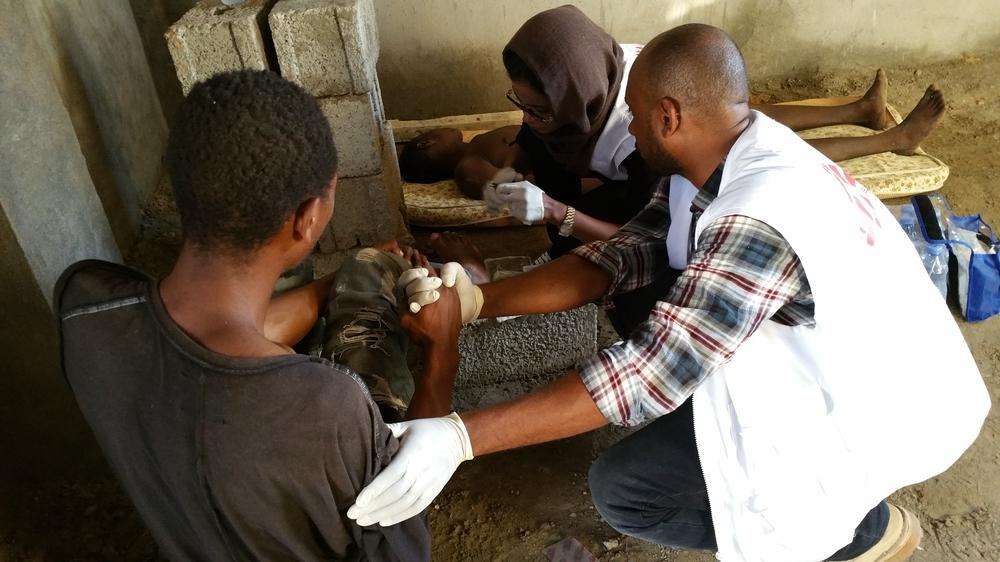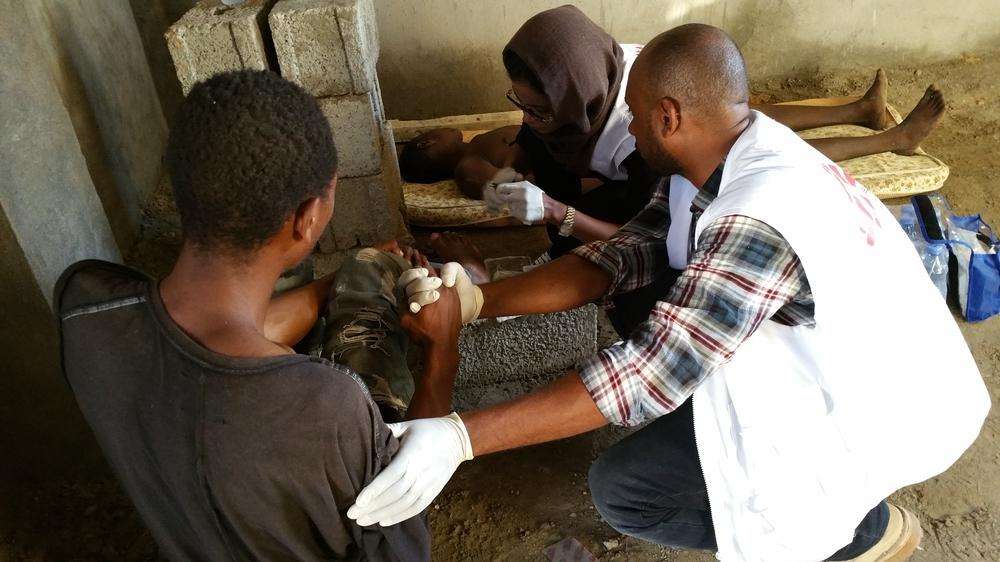Libya remains fragmented by ongoing conflict in several parts of the country. The insecurity, economic collapse, and breakdown of law and order make daily life a struggle for many Libyans, and for the hundreds of thousands of refugees, asylum seekers, and migrants who enter the country after fleeing conflict, extreme poverty, or persecution in their home nations.
Many migrants inside Libya are unable to return home. Refugees and asylum seekers cannot receive protection due to the country's lack of a functioning asylum system, the limited role of UNHCR, and the fact that Libya is not a party to the Refugee Convention.
Displaced people in Libya are exposed to alarming levels of violence and exploitation at the hands of security forces, militias, smuggling networks, criminal gangs, and private individuals. Doctors Without Borders/Médecins Sans Frontières (MSF) teams working from rescue ships on the Mediterranean Sea have heard horrific accounts from many individuals who joined the 50,000 men, women, and, increasingly, unaccompanied children (some as young as eight years old) who fled Libya and undertook the treacherous journey to Europe.
Those intercepted at sea by the Libyan Coastguard or detained inside Libya are sent to migrant detention centers—often former factories or warehouses. In these facilities people face arbitrary detention for prolonged periods of time in unsanitary and inhumane conditions. They have no way to challenge the legality of their detention, virtually no access to the outside world, and often suffer ill treatment and a lack of access to medical care.
Access to Health Care in Detention Facilities
MSF currently runs mobile clinics in seven migrant detention centers located in Tripoli and its surroundings, which are under the administration of the Directorate for Combating Illegal Migration (DCIM), also known as the Anti-Illegal Immigration Agency (AIIA).
Since activities started in July, MSF has conducted 5,579 medical consultations, with medics currently carrying out around 500 consultations every week. Thirty-two pregnant women in detention received antenatal consultations and 41 consultations were for children under five years of age, several of whom were born in a detention facility. The youngest patient seen was only five hours old.
In the event of a medical emergency inside a detention facility, with the agreement of the DCIM, MSF attempts to arrange a referral to a hospital. So far, there have been 113 urgent or complicated medical cases referred to a health facility for further treatment, including seven people with severe psychiatric disorders. Each referral is complicated and time-consuming, as many hospitals in Tripoli do not want to admit sub-Saharan Africans.
Medical Cases Linked to Detention Conditions
MSF medics working with migrants and refugees regularly treat respiratory tract infections, acute watery diarrhea, skin diseases, and urinary tract infections. These complaints are mostly related to conditions inside the detention centers, which do not meet any national, regional, or international standards. Many are dangerously overcrowded, with a lack of natural light and ventilation. In some facilities, the amount of space per detainee is so limited (sometimes less than five square feet per person) that people are unable to stretch out at night, resulting in many complaints of body aches.
There is also a shortage of food in the detention centers, making people more susceptible to disease and acute illness. Significant numbers of detainees have suffered dramatic weight loss and exhibit nutritional deficiencies due to small rations averaging just 600 to 800 calories per day and the unbalanced nutritional content of what they do eat—food often consists of plain macaroni. Sometimes one food ration is shared between five or more detainees, or is served in communal bowls, meaning that the weakest and most infirm often receive none at all.
The number of adult malnutrition cases MSF sees is increasing, with 41 people suffering from moderate to severe malnutrition screened in the first half of November. This represents around 3 percent of all detainees in facilities visited by MSF. The number of adults suffering from malnutrition to this degree in a country not suffering from drought or natural disaster is of great concern.
Detainees do not have adequate access to safe drinking water, with some receiving less than one liter per person per day (far below minimum acceptable quantities), and as a result many suffer from headaches, constipation, and dehydration. Access to latrines or showers is also severely limited and sanitation facilities are inadequate, resulting in high rates of skin infections and infestations of lice, scabies, and fleas.
MSF distributes hygiene kits to detainees in detention centers visited by its medical teams, and has also distributed jerry cans, buckets, and cleaning materials to other facilities. In specific instances when food supplies have run out and the situation became critical, MSF brought in sacks of bread and boxes of processed cheese from local markets to feed detainees. MSF continues to urge all relevant authorities to provide sufficient quality and quantities of food supplies.
A psychological first aid team also supports detainees who have been involved in traumatic incidents at sea. Support was provided to 29 survivors involved in a shipwreck on October 27, where at least 100 people drowned. The team aims to improve access to mental health services and psychosocial support, not only for migrant populations but also for Libyans in the Tripoli area.
It is MSF's hope that maintaining a presence and providing medical care in detention centers can help ensure an immediate improvement in the living conditions of detainees. Every day MSF teams advocate for the humane treatment of those being held in detention, stressing the importance of adequate food and water and access to working latrines and washing facilities. MSF also pushes authorities to release pregnant women, women with babies and young children, detainees under the age of 18, and those who are disabled or have serious health conditions.
MSF remains opposed to the indefinite arbitrary detention of migrants, refugees, and asylum seekers in Libya.





